Rob Walker's Blog, page 5
November 13, 2010
S.O. Book News
IN THIS POST: Mark Doty, Laura Lippman, Kurt Andersen, Kate Bernheimer, John Wray.
This is the seventeenth installment in a series of twenty posts announcing — in no particular order — which 100 stories will be collected in the Significant Objects book (forthcoming in 2011 from Fantagraphics).
***

81. Mark Doty's FISH SPOONS story. Excerpt:
As a young man I read a poem I've never run across again since. I found it in the school library. If you already knew what you wanted in this haphazard collection, you were sunk, but if you spent time pulling things off the high, not-much-visited steps, you could get lucky.The poem was Anglo-Saxon, a riddle, and it had to do with cold armor that never clanked, with chain mail that moved with a strange fluidity, as if it were made of mercury – though I'm sure I've added that detail, in memory. The Anglo-Saxons didn't have mercury, did they? Or maybe they did.
I think what I liked best about the poem was the feeling of things moving in darkness, beneath the surface, not at all troubled about being in the dark. That and something about the allure of ancient silver, that there were mines, somewhere in the far mountains, and people had learnt the methods of refining the hidden ore and bringing the malleable shining stuff into the light.
***

82. Laura Lippman's MOTEL ROOM KEY story. Excerpt:
"I wasn't spying," she said. "But I have to ask – why did you save this?""Well, look at the name," he said. "Perkins hotel."
He waited, smiling broadly.
"I don't get it."
"Remember the movie Psycho?"
She did. Taxidermy, shower, mother issues. "That was the Bates Motel."
"Yes, but the actor was Anthony Perkins. Isn't that cool?"
"And what took you to Laconia, New Hampshire?"
"A road trip with a bunch of guys in our junior year of college." He held the key, ran his thumb over it. "Drop in any mailbox," it said, but he hadn't.
***

83. Kurt Andersen's SANTA NUTCRACKER story. Excerpt:
We were out on the porch again, me cracking pecans, and we'd just heard a train pass by and blow its whistle, and suddenly she asked if I wanted to take the Santa Claus cracker to keep, as a keepsake, since with Marcus Sr. gone she'd decided she'd stop baking pies. I didn't really want it, but to be polite I said sure, and thanked her. Then in a big gulp she finished her third glass, and sort of giggled. "But don't you ever do what I once caught Jimmy doing, OK?" When I asked what that was, she giggled again and said she couldn't say, but I chuckled too and kind of insisted, so she told me. One afternoon in the spring of 1945, when Jimmy was 14, she'd heard on the radio that the Nazis had surrendered, so she ran into Jimmy's room to tell him, and found him sitting on his bed with his pants off and his penis stuck in the nutcracker.
***

84. Kate Bernheimer's PINK HORSE story. Excerpt:
That pink horse! How she loved it. Once when she had gone a very long way to gather her treasures — all the way under a natural tunnel inside the cliffs, which led to a narrow beach that would trap you and kill you if you were stuck there during high tide — an old woman with pink hair approached her and sang her a song. My daughter told me about this old woman, but I didn't believe her. Later that week, my girl brought home a sea urchin, closed. She said that when the sea urchin opened, the old woman would return and that she had promised then to bring us good luck. I got an empty jar from the cupboard — it had once been full of beach plum jelly but had been long gathering dust. We walked down to the edge of the ocean and filled it with water. Back in the cabin, we placed the closed sea urchin carefully into the water, where it sank and stayed closed. The next morning my littlest girl didn't wake up and the sea urchin had bloomed. It was on her grave that my other daughter placed the pink horse.
***
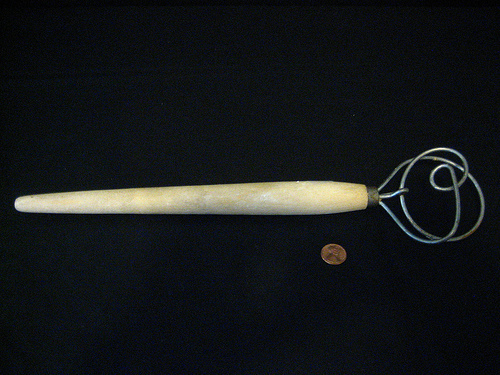
85. John Wray's IMPLEMENT story. Excerpt:
"What is it?" said Lily."I just told you," Oliver said patiently.
The Object expressed no opinion.
"Well, we might as well give it a try," Lily said. "How do we make it do?"
Oliver squinted down at the Object for a while, and then shrugged. "I think we just set it down in the corner," he said finally. "Give it room to do its work."
Lily considered this a moment, then took Oliver's hand, and they deposited the object, gently and circumspectly, in the room's nearest corner. "How long will it take?" Lily wondered.
"Ten and a half days," Oliver said firmly. Lily couldn't help noticing, however, that he avoided looking her in the eye. You'll never persuade me that way, Lily said to herself. The Object chittered and hummed in its corner.
***
MORE NEWS: For updates about the Significant Objects project and forthcoming (Fall 2011) collection, visit the archive and subscribe via RSS. For Author Updates, visit the archive and subscribe via RSS. Also: Check out the Significant Objects Bookstore!

November 11, 2010
Another author meets an object made Significant

One of our favorite S.O. buyers sent along these images documenting a rare convergence of Significant Object, author, and new owner. On the left, that's Stewart O'Nan, whose Duck Tray story was an early highlight of Vol. 1 of this project. On the right is David Mahlstedt, happy recipient of the Duck Tray (by way of a thoughtful gift from Trifin and Jeannie (who took this pictures) Roule. He is, we are told, an enthusiastic O'Nan fan. So how cool is that?

In addition to signing his story, O'Nan signed the object itself: "In my mind," he writes, the duck tray is "still on Henry's dresser." Enjoy the story again here, and you may just agree.


November 10, 2010
The Object Whisperers
Earlier this fall, in an interview with Significant Objects' co-curator Rob Walker, MoMA's Paola Antonelli called Rob an "object whisperer."
Amused and intrigued by this moniker, Randy Ludacer of Beach Packaging Design and the excellent packaging-criticism blog Box Vox, whipped up a couple of cards for us.
Here's Rob's card:

Coincidentally, about fifteen years ago, Josh (coauthor of The Idler's Glossary) wrote several items about "idler etiquette" for The Idler, a British magazine. Most of these items were actually about stationery. One of these items called for idlers to eschew business cards in favor of personal cards. Excerpt:
It's bad enough that we should be asked to spend most of our adult daylight hours trapped in an office; but when socializing it's almost criminal to hand out a business card. Our inherent fabulousness — which is, after all is what we're here on earth to develop and display for all to see — can in no way be expressed by a business card, no matter how illustrious one's company or title. On that point I am adamant. But I wouldn't suggest reverting to scribbling one's name on matchbooks (any sexiness which that act once held has long since been commercialized out of existence), or doing what I myself did for so long: carefully crossing out every work-related element of my business card before handing it out at parties. What we all need, clearly, is what I like to call a "personal card."
As Rob likes to say, Voilà!

Many, many thanks to Mr. Ludacer for his excellent work.

S.O. Book News
IN THIS POST: Tom McCarthy, Nathaniel Rich, Merrill Markoe, Matthew De Abaitua, and Matthew Battles.
This is the sixteenth installment in a series of twenty posts announcing — in no particular order — which 100 stories will be collected in the Significant Objects book (forthcoming in 2011 from Fantagraphics).
***

76. Tom McCarthy's MERMAID FIGURINE story. Excerpt:
1. Pollution of coastal waters can have / the black sun of melancholy / signature of all things I am here to / test for indicator organisms such as / Love or Phoebus, Lusignan or Biron / based on weekly or fortnightly water sampling2. The beach zone is modeled as / the grotto where the siren / (see Fig. 1) / wind-generated surface advection and / have lingered in / with parameter estimation / limit of the diaphane / with uniform pollution concentration
3. Wild sea money / dc and dt: decay and mixing / language tide and wind have silted / to a build-up of pollutants during / the night of the tombs, you who consoled me / (see Fig. 2)
***

77. Nathaniel Rich's RHINO FIGURINE story. Excerpt:
Do you ever struggle to remember insignificant facts? Facts so small and irrelevant to the natural course of your life that you wonder how you ever learned them in the first place? And yet your inability to recall them infuriates you. Who was the actor in that Greek film, you know the one with Melina Mercouri, from the sixties? What do you call the stick that leprechauns carry? What's your cousin's girlfriend's name? Is it "Man on the Run," or "Band on the Run"? Who is that famous autistic lady who writes about what it's like to be an animal?The answers to all of these questions and more will be answered when you come into proud possession of the Rhinoceros Knows. Whenever you feel stumped, simply rub its nose (also known as its "horn"). You will feel a jolt of energy in your neurons, your synapses will grow extra sticky, and your frontal lobe will throb pleasantly. Also, the rhinoceros's eye will, ever so subtly, twinkle.
***
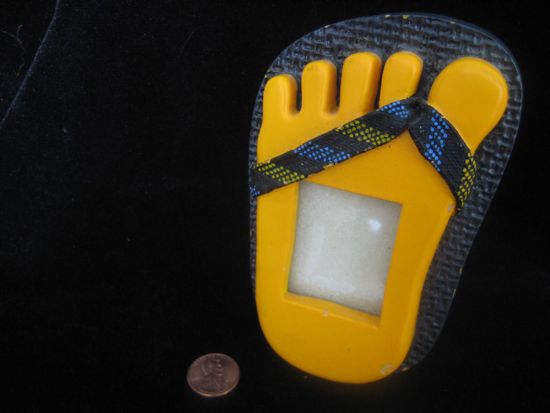
78. Merrill Markoe's FLIP-FLOP FRAME story. Excerpt:
You need a place to put that unpleasant souvenir of friendship gone sour. One that will admonish you never to take his phone calls again. Ditto the business card left behind by the tech guy who came to fix one broken USB port, disassembled your entire Internet connection, refused all blame, and insisted on getting his full fee.Well, some people put these things at the center of dartboards. But that has become a cliché. And why run the risk of attracting unwanted dart games? No, when you want to demean an image, hold it up to spite and ridicule and single it out as something worthy of scorn, you want a frame that conjures a rage like the one that overwhelmed that Iraqi journalist who threw his shoes at George Bush. You want a frame that says "I step on you with my bare dirty feet."
***
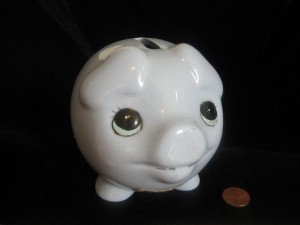
79. Matthew De Abaitua's PIGGYBANK story. Excerpt:
Because of Grandad, our family has to keep the piggybank with us always. Grandad met the devil coming out of his wardrobe and the devil promised him death, death right there and then, and Grandad said no, and so a deal was struck. If the piggybank goes out the back door, death comes in through the front door.On pay day, one half of all the money that crosses the doorstep goes into the piggybank. Daddy comes back from his job making safe the gas in the iron lungs that rise and fall across our town, rise and fall like the valves of the trumpet he plays on our birthdays. He takes out his pay packet and pinches half of the notes between his fingers and hands the money to Mummy, without looking at it. It is Mummy's job to place the tribute into the cursed pig.
Daddy gets angry so suddenly, it makes it hard to breathe. I know he doesn't mean it. I tell him not to be so angry with me and he stops, and he looks sad. I'm a big girl. I know how hard the days of grown-ups can be, so hard you wouldn't believe.
***

80. Matthew Battles' CANDYLAND LABYRINTH GAME story. Excerpt:
"Choose your color!" he replied. "Doesn't matter which. Your favorite color. Whatever color catches your… your fancy! It will be the right one, I'm sure."You shuddered — and then simply, with a shrug, you said, "red." The man drew from his pockets the small plastic box, the prism mapped with colored blocks and candycanes. He shook it slowly in the plane of the earth's surface. As if sifting for some artifact. A smile hung in the depths of his hood, and the smile grew. Tiny figures darted up and down the rainbow trail, until the hand — dry, you noted, but somehow shockingly soft — the hand froze when the red man came to rest at the end of the trail. And with a seeming gust of wind (though nothing rustled, nothing shifted), the world went red (though nothing changed).
And now the little box was in your hands; the plump and shapeless man was gone. How had he so quickly transferred it to you? How did he make his vast bulk so thoroughly disappear? Questions that disappeared in a purple mist that faded to red, leaving you with the little rattle-box labyrinth and a growing deadness that flowed down your limbs and into your heart.
***
MORE NEWS: For updates about the Significant Objects project and forthcoming (Fall 2011) collection, visit the archive and subscribe via RSS. For Author Updates, visit the archive and subscribe via RSS. Also: Check out the Significant Objects Bookstore!

November 9, 2010
Author Updates
IN THIS UPDATE: Miranda Mellis
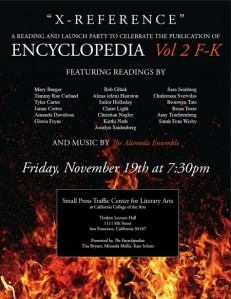
1) Miranda Mellis invites one and all to X-REFERENCE, a multimedia launch party to celebrate the launching of ENCyClopEdiA Vol 2 F-K. There will be readings, performances, and collaborations by local vol. 2 contributors: Mary Burger, Tammy Rae Carland, Tyler Carter, and many others. Friday, November 19th at 7:30pm at Small Press Traffic Center for Literary Arts (at California College of the Arts), Timken Lecture Hall, 1111 8th Street, San Francisco. Presented by The Encyclopedists (Tisa Bryant, Miranda Mellis, Kate Schatz).
***
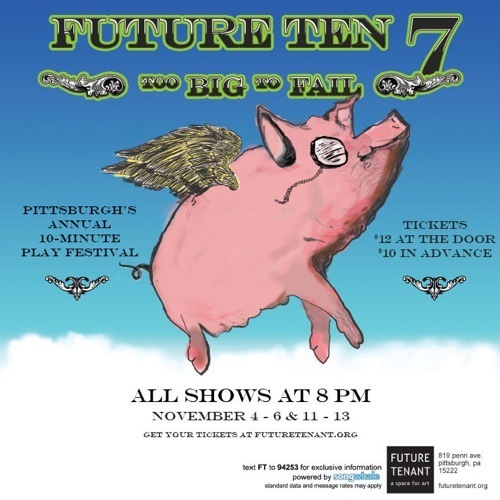
2) Joe Lyons invites one and all to attend Future Ten 7: Too Big To Fail, Pittsburgh's annual 10 minute play festival. Joe's newest play, There Will Be Jetpacks, a tale of how to love/ruin your family through science, will be among the evening's 8 selections. The show runs November 4th through 6th and the 11th through the 13th. All shows start at 8pm and tickets are $12 at the door ($10 if purchased in advance). Go to Futuretenant.org for tickets and details.
***
MORE NEWS: For updates about the Significant Objects project and forthcoming (Fall 2011) collection, visit the archive and subscribe via RSS. For Author Updates, visit the archive and subscribe via RSS. Also: Check out the Significant Objects Bookstore!

November 8, 2010
Author Updates
IN THIS UPDATE: Toni Schlesinger, Ed Park.
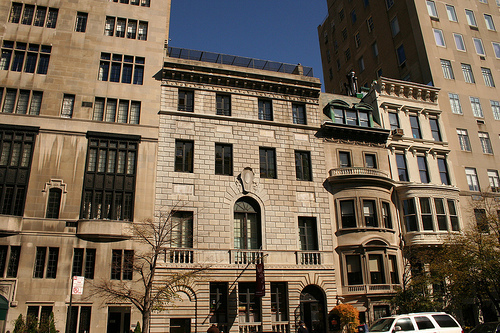
1) Today at 6 pm, Toni Schlesinger reads an excerpt of a new book in progress at the The New York Society Library. INFO: Members' Room, 53 East 79th Street, 212-288-6900 x244. Schlesinger's most recent original theater piece was The Palace, which played in June at St. Ann's Warehouse, in New York.
***
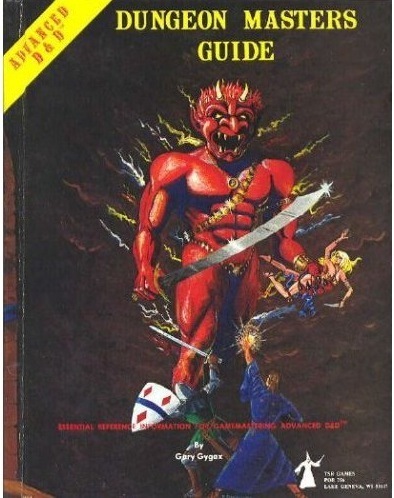
2) Ed Park has a story in Bound to Last: 30 Writers on Their Most Cherished Book!, which was published last week. He notes that the story, "Dungeon Masters Guide," will be the third in "my D&D/RPG 'trilogy' of tales (thus far comprising 'Welcome to Tyosen™!' and 'Cow Vase')." Click on Ed's name, to read "Cow Vase."
***
MORE NEWS: For updates about the Significant Objects project and forthcoming collection, visit the archive and subscribe via RSS. For Author Updates, visit the archive and subscribe via RSS. Also: Check out the Significant Objects Bookstore!

November 7, 2010
Significant Tweets for Week Ending 2010-11-07
Unusual vintage laboratory photos – Boing Boing http://t.co/oZdgetO [Is Josh's latest VISTA contraption depicted here? Perhaps, perhaps.] #
Horribly disfigured porcelain dolls – Boing Boing http://t.co/hqh9Zc9 #
Book cover postcards: http://bit.ly/bUv7Lb #
Library designed around the idea of not having any books. http://tumblr.com/xr4oe8azq #
Pretty neat bookmarks: http://bit.ly/bD977l #
Photos of food that costs $1, by Jonathan Blaustein http://tumblr.com/xr4o6rvcq #
Very cool publisher logo discovered at used bookstore. http://tumblr.com/xr4o6rqjy #
Inside the Google Books Algorithm – Alexis Madrigal – Technology – The Atlantic http://t.co/nxRU6SD via @AddThis #
Powered by Twitter Tools

November 5, 2010
S.O. Book News
IN THIS POST: Heidi Julavits, Gary Panter, William Gibson, Victor Lavalle, Tom Vanderbilt.
This is the fifteenth installment in a series of twenty posts announcing — in no particular order — which 100 stories will be collected in the Significant Objects book (forthcoming in 2011 from Fantagraphics).
***

71. Heidi Julavits' WOODEN APPLE CORE story. Excerpt:
Soon she'd stopped eating (the smell of food, she claimed, made her ill), as if to prove that she was right and I wrong regarding certain things. So I started to carve, in our garage, from pieces of oak left by the former owner, a so-called neoclassical orthodontist who whittled, in his spare time, the many sets of wooden teeth he'd left behind on crooked shelves, her favorite fruit. I carved whole pears and whole oranges, but found that I hated to see, at the end of a breakfast, say, my plate empty and hers full. I returned to the workshop and carved wood into the shape of already-eaten food; halfway through our meals I would exchange the uneaten food for the already-eaten food, and I would congratulate her on her excellent appetite, and this would make her cry at how well I understood her.
***
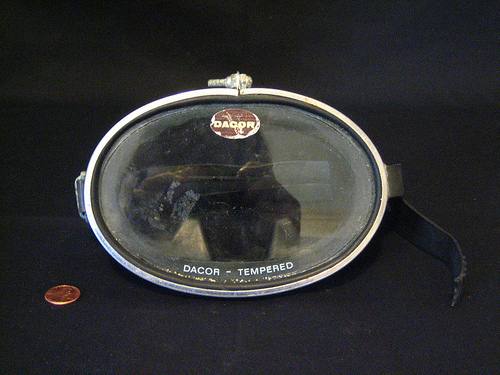
72. Gary Panter's DIVE MASK story. Excerpt:
Step three, the final step, was to make a torso to go with the Mole Man mask. The torso started as a lightweight frame made out of laths I retrieved from the shutter factory's trash heap. I mounted the frame and Mole Man mask onto a Styrofoam beer cooler lid. I added muslin fabric ripped into strips and dipped in Elmer's glue — both borrowed from Dad's shop. It looked pretty great. The whole episode was worth it for the thrill of seeing "the monster" all painted up and crazy out in the garage.Donned the dive mask and swam out in the afternoon; dropped a concrete block a hundred feet offshore by the picnic area in eight feet of water and threaded the rope through one of the holes on the block. Attached one end of the long rope to the monster. Floated the whole contraption out by tugging the other end of the rope threaded through the block — a simple pulley. The monster settled over the submerged block and bobbed when I jerked the rope. When I pulled really hard I got it all the way underwater, which was perfect. Couldn't believe it worked.
***

73. William Gibson's "HAWK" ASHTRAY story. Excerpt:
He was a good guy, David. In 1969 he told me that what was going to happen with the Soviet Union was that it was going to go bankrupt. He said they were cooking the books, fooling themselves that their economy worked, that their system made sense. He wasn't talking politics. He was an engineer. He was absolutely right, though I confess I didn't buy it. I couldn't imagine a world without the Soviet Union. He called it. The only thing he got wrong was the food riots. In the end, they weren't necessary. In the meantime, he said, we just had to hold them at bay. With tie-tacks.This ashtray, I imagine, came from somewhere further along the Hawk missile system's developmental span. Ashtrays aren't liminal. When you're passing out ashtrays, you've actually got a product. When they passed a little spring-topped jewelry box, closed, to one of the über-geeks, that confidential "check this shit out" moment, it wasn't a product, it was a glyph, something there but not there, half-juggled from the Dreamtime.
***
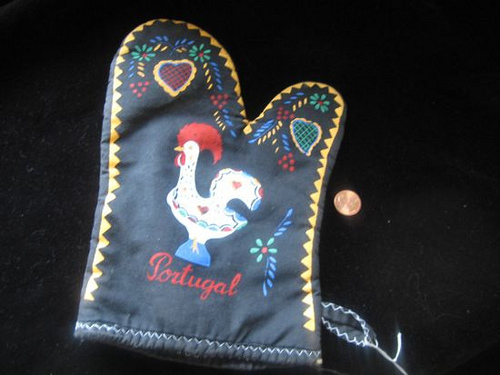
74. Victor Lavalle's ROOSTER OVEN MITT story. Excerpt:
My friend slides the glove on, reaches into the oven, but as she's pulling the tray she loses her grip and the squash goes to the ground. I just laughed. I was drunk, and this pretty lady had already let me kiss her. What could I be upset about?But she wore another expression. Not anger. Not pain. Bewilderment. She slipped the oven mitt off and turned it inside out. I thought she was going to rip it so I shouted, but then I saw the inside of the oven mitt. It was covered in words.
Not writing. Letters stitched into the fabric! We read the words, starting at the top, where the middle finger would reach. It read: My dearest Grace (that's my grandmother) I hold your memory like I held your form. I feel sunlight across my body and the warmth of you. The warmth of being inside you…
And it went on like that.
A lot.
Turns outs my grandmother was kind of a slut!
***

75. Tom Vanderbilt's MARINES (UPSIDE-DOWN) LOGO MUG story. Excerpt:
And then the mug. It was placed in front of him, on his padded desk calendar, eclipsing March 3rd. It was a simple thing, really, the sort they ran millions of in a year, being the DOD's favored insignia contractor. Fortuna Favet Fortibus, it read, Fortune Favors the Strong. The error was so basic, so obvious, that he wondered if there weren't some hidden layer of complexity at work here. Privately, he allowed that one might read the mug's form factor in two ways: The wider, curved flare made most sense as the vessel's egress point, so the lips could comfortably adhere to the contours. And yet in some kind of drink-ware equivalent of a Necker Cube, the brain might willfully invert the mug, so that the wider end could logically seem the stable base, as with the cooling towers of Three Mile Island.
***
MORE NEWS: For updates about the Significant Objects project and forthcoming collection, visit the archive and subscribe via RSS. For Author Updates, visit the archive and subscribe via RSS. Also: Check out the Significant Objects Bookstore!

November 3, 2010
Author Updates
IN THIS UPDATE: Jason Grote, Rebecca Wolff, Kate Bernheimer.

1) This month, Jason Grote's play 1001 will be produced at NYU's Gallatin School and at Howard Community College in Maryland.
***

2) Rebecca Wolff has a long poem — "The Curious Life and Mysterious Death of Peter J. Perry" — coming out in The Literary Review this month.
***

3) Kate Bernheimer and Neil LaBute will be interviewed by Lynn Neary about fairy tales on NPR's Weekend Edition, on Sunday, November 7. Airing sometime between 8:40 a.m.—9:45 a.m. EST and available on the NPR website.
***
MORE NEWS: For updates about the Significant Objects project and forthcoming collection, visit the archive and subscribe via RSS. For Author Updates, visit the archive and subscribe via RSS. Also: Check out the Significant Objects Bookstore!

November 1, 2010
S.O. Book News
IN THIS POST: Stephen O'Connor, Colson Whitehead, Shelley Jackson, Scarlett Thomas, Nicholson Baker.
This is the fourteenth installment in a series of twenty posts announcing — in no particular order — which 100 stories will be collected in the Significant Objects book (forthcoming in 2011 from Fantagraphics).
***
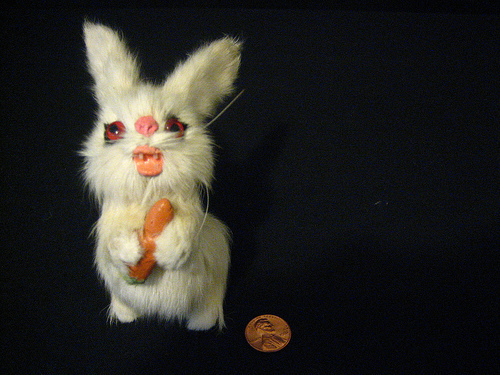
66. Stephen O'Connor's BUNNY story. Excerpt:
Nobody could remember back before everything was Astroland, but some people pretended. Hop-a-Long was one—so-called because of his gigantic tinsel-furred ears, his rabbit-eye-red eyes, but not because he hopped. He didn't hop. He rocked from foot to foot as he walked, like a chair coming down the hall by itself. "Back then everything was real," he said. "It was boring. Fishtails weren't worked by levers and springs. A world without a sense of humor." Hop-a-Long the stinky. Hop-a-Long with the bubble-gum-wad nose. With the almost-topple-every-step walk."Blat!" said Flippy-Foot.
"How?" said Injun Joe.
"I don't know," said Hop-a-Long. "It was brainless existence. People had to make excuses to live."
***
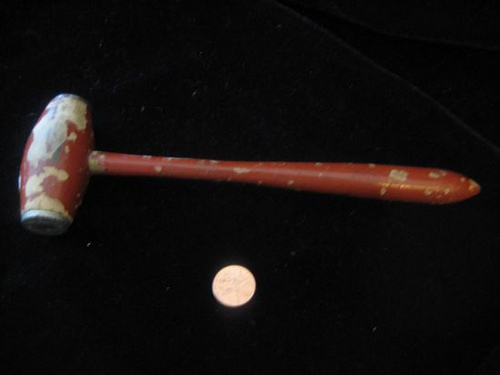
67. Colson Whitehead's WOODEN MALLET story. Excerpt:
On September 16th, 2031 at 2:35 am, a temporal rift – a "tear" in very fabric of time and space – will appear 16.5 meters above the area currently occupied by Jeffrey's Bistro, 123 E Ivinson Ave, Laramie, WY. Only the person wielding this mallet will be able to enter the rift unscathed. If this person then completes the 8 Labors of Worthiness, he or she will be become the supreme ruler of the universe.
***

68. Shelley Jackson's CRUMB SWEEPER story. Excerpt:
When I first met him, the moon — a chip of bone in the pale blue of morning — was just past full. I can be sure of that, though it was only later that the phases of the moon became as familiar to me as the seasons or as my breath coming and going. He was crouching against a tree in Prospect Park, nearly naked despite the autumn chill, the pale skin stretched over his shuddering ribs disfigured with a rash. He was swiping at his red, swollen, and tearing eyes with one paw, while the other, with a very practiced motion, was employing what looked at first glance like a bar of soap, to harry clouds of short, coarse, whisky-colored hairs from a pair of loose drawstring pants and a tunic draped over his lap. I did not think anything of the fact that both items appeared to be inside out. I did not pay any special attention to the fellow at all, who seemed to me an everyday sort of eccentric, only (for I have an eye for curiosities, particularly those ingenious contraptions rendered pathetically de trop by advancing technology — clockwork computers, water clocks and the like) to the object he was holding, which I now saw to be a rounded bar of ivory (or an imitation) in which a cylindrical brush had been ingeniously set so that it might skim a smooth surface and rid it of debris — the tool of a butler or maître d', I thought, for clearing crumbs from a place-setting.
***

69. Scarlett Thomas' BIRTHDAY CANDLES story. Excerpt:
You can find all kinds of crap in the back of drawers. Here is the string we once used to tie the handles of the French doors together so that Julius wouldn't open them and walk into the pond. Here is a thimble, and a seam-ripper, although I don't think anyone in our family ever ripped a seam on purpose. Here is an incomplete pack of cards with topless women on the backs, the best ones stolen by my brothers. Here is dust, dust, and underneath a pair of dice: one small and black, one big and red. There is a blister pack with no tablets in it and the silver tape measure that bites your fingers when it snaps back. There are the birthday candles I bought when I was seventeen. After I bought them I walked home from the corner shop imagining the hot wax dripping onto my naked skin and Mark, who still owed me for the mayonnaise thing, peeling it off after it had dried.
***

70. Nicholson Baker's MEAT THERMOMETER story. Excerpt:
Everything had a temperature in those days. Cheese was cold. Avocados were warm. My heart was a piece of hot meat pierced by love's thermometer.
***
MORE NEWS: For updates about the Significant Objects project and forthcoming collection, visit the archive and subscribe via RSS. For Author Updates, visit the archive and subscribe via RSS. Also: Check out the Significant Objects Bookstore!




